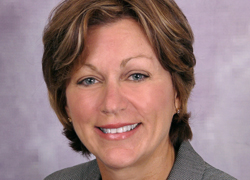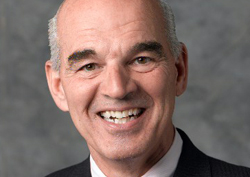 |
Mary Cramer, Ph.D. |
 |
Glenn Van Ekeren |
The $500,000, two-year grant will fund the Midwest Geriatric Nursing Quality Improvement Program.
The program aims to improve patient care, family and staff satisfaction, retention of nurses and administrators and the work environment in general, said Mary Cramer, Ph.D., associate professor from UNMC College of Nursing and co-principal investigator of the grant.
A burgeoning issue
“The population is aging at a time when there is a critical shortage of nurses trained in geriatric care,” Dr. Cramer said, who noted that the elderly currently compose about 13.5 percent of Nebraska’s population. That number climbs to about 18.4 percent in rural areas, she said, and it’s estimated that the elderly will compose 62 percent of the state’s population by 2030.
This surge in the elderly population will create a heavy demand for quality long-term care facilities but inadequate education in geriatric nursing care and management contributes to high turnover and vacancy rates, which hinders quality patient care.
|
The grant aims to confront this situation with increased geriatric care education for registered nurses and leadership development for nurse managers.
The Vetter Foundation of Nebraska is the lead foundation for the project. The UNMC College of Nursing is the lead organizational partner.
Glenn Van Ekeren, executive vice president of the Vetter Foundation, is co-principal investigator of the grant and will lead foundation efforts.
He said ensuring a highly prepared nursing workforce in long-term care facilities supports the educational mission of the Vetter Foundation.
“The quality of life and quality of care of our seniors will undoubtedly be enriched by nurses specifically trained in geriatric care and leadership practices,” Van Ekeren said.
Local groups support important initiative
Kathy Wolfe, director of development, University of Nebraska Foundation, said the foundation’s proposal for the grant was strengthened by the generosity and diversity of the funding partners.
“They join us in this effort to enhance long-term nursing care in our region,” she said. “It is an honor to work with them on this important initiative.”
Current workforce lacks education in geriatric care
Only two schools of nursing in Nebraska require gerontology as a separate course in nursing school, Dr. Cramer said. Estimates indicate only 36 percent of Nebraska nurses have had any kind of geriatric education.
“There are many registered nurses generally not prepared to work with older adults,” Dr. Cramer said. “The older person isn’t the same as a middle age person. They have a host of unique problems and generally live with multiple chronic conditions that complicate care. The grant will raise the bar for quality.”
Education to occur at multiple levels
Through the grant, nearly 100 registered nurses from facilities owned by the four long-term care companies involved in the grant, will take a 10-week, continuing education course in geriatric nursing care.
The classes include nurses from:
- Tabitha Health Care Services;
- Golden Living;
- Nye Senior Services; and
- Vetter Health Services.
Most of the facilities are in Nebraska, with a handful in Iowa, South Dakota and Wyoming.
About 70 registered nurses, charge nurses, directors of nursing and nursing administrators in long-term care facilities, will take leadership and management classes. Some will pursue a national nurse executive certification.
A Geriatric Leadership Academy also will be created to establish best practice standards in long-term care and to recognize excellence in nurse leadership.
Career ladder program to improve education, retention
Long-term care facilities involved in the grant will institute a Career Ladder program that will provide financial incentives to nurses who become certified in gerontology and/or earn bachelor’s degrees. This is expected to improve recruitment and retention of registered nurses in long-term care.
“We are committed to helping find the most innovative solutions to the nursing shortage so we can protect patients now and over the long-term,” said Susan Hassmiller, Ph.D., senior adviser for nursing at the Robert Wood Johnson Foundation. “This unique partnership of the philanthropic community helps identify new approaches that go well beyond what any one foundation could do alone.”